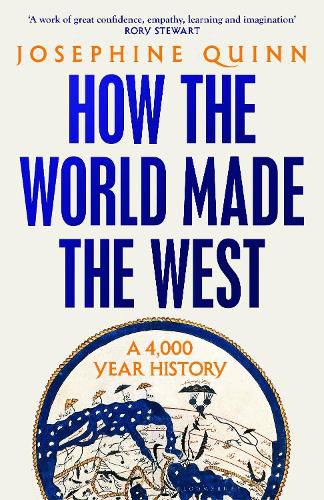Readings Newsletter
Become a Readings Member to make your shopping experience even easier.
Sign in or sign up for free!
You’re not far away from qualifying for FREE standard shipping within Australia
You’ve qualified for FREE standard shipping within Australia
The cart is loading…






The West, the story goes, was built on the ideas and values of Ancient Greece and Rome, which disappeared from Europe during the Dark Ages and were then rediscovered by the Renaissance. But what if that isn't true?
In a bold and magisterial work of immense scope, Josephine Quinn argues that the real story of the West is much bigger than this established paradigm leads us to believe. So much of our shared history has been lost, drowned out by the concept developed in the Victorian era of separate 'civilisations'.
Moving from the Bronze Age to the Age of Exploration, How the World Made the West reveals a new narrative - one that traces the millennia of global encounters and exchange that built what is now called the West, as societies met, tangled and sometimes grew apart.
From the creation of the alphabet by Levantine workers in Egypt, who in a foreign land were prompted to write things down in their own language for the first time, to the arrival of Indian numbers in Europe via the Arab world, Quinn makes the case that understanding societies in isolation is both out-of-date and wrong. It is contact and connections, rather than solitary civilisations, that drive historical change. It is not peoples that make history people do.
$9.00 standard shipping within Australia
FREE standard shipping within Australia for orders over $100.00
Express & International shipping calculated at checkout
The West, the story goes, was built on the ideas and values of Ancient Greece and Rome, which disappeared from Europe during the Dark Ages and were then rediscovered by the Renaissance. But what if that isn't true?
In a bold and magisterial work of immense scope, Josephine Quinn argues that the real story of the West is much bigger than this established paradigm leads us to believe. So much of our shared history has been lost, drowned out by the concept developed in the Victorian era of separate 'civilisations'.
Moving from the Bronze Age to the Age of Exploration, How the World Made the West reveals a new narrative - one that traces the millennia of global encounters and exchange that built what is now called the West, as societies met, tangled and sometimes grew apart.
From the creation of the alphabet by Levantine workers in Egypt, who in a foreign land were prompted to write things down in their own language for the first time, to the arrival of Indian numbers in Europe via the Arab world, Quinn makes the case that understanding societies in isolation is both out-of-date and wrong. It is contact and connections, rather than solitary civilisations, that drive historical change. It is not peoples that make history people do.
The Jaipur Literature Festival is certainly one of the great festivals of the world. It draws an amazing array of guests from the Indian subcontinent and beyond. I was fortunate to be able to attend this year’s festival in February and, while there, discovered the work of Josephine Quinn. Historians such as Peter Frankopan and Mary Beard expressed awe at her work and particularly her groundbreaking new book, How the World Made the West.
In the mid 1990s, historian Samuel P. Huntington, in his book The Clash of Civilizations, extolled the virtues of so-called Western civilisation above those of other civilisations. Those ideas were embraced in Australia, and we are home to the Ramsay Centre, which works with universities and schools to promote and study the idea that ‘Western civilisation’ has its roots in classical Rome and Athens and was developed and refined through the ages, culminating in the Enlightenment in Europe.
Quinn, through her research, disputes the idea of discrete, and therefore competing, civilisations. She argues that, ‘There has never been a single, pure Western or European culture.’ Her research, which includes advanced discoveries in DNA, shows that, ‘The West itself is in large part a product of long-standing links with a much larger network of societies.’
The ‘West’ wasn’t just born in Greece and Rome; those cultures borrowed and absorbed ideas and technology from other people: the wheel from the Central-Asian steppe, poetry from Persia, legal codes from Mesopotamia, mathematics from Babylon and India, Mongolian stirrups, gold from sub-Saharan Africa, maritime skills from the people of the Levant and the far north, and religion from Asia. Quinn convincingly argues that the idea of a dominant civilisation is a false one and that history shows how people borrow and adapt ideas and customs from others.
Offering a wealth of history across the ages, the books in this collection focus on female authors.
Delve into histories of the world with these fascinating books, curated by Readings booksellers.
From Egypt to Greece, Rome to Persia to China, these books teach us about the Ancient civilisations that shape our world.